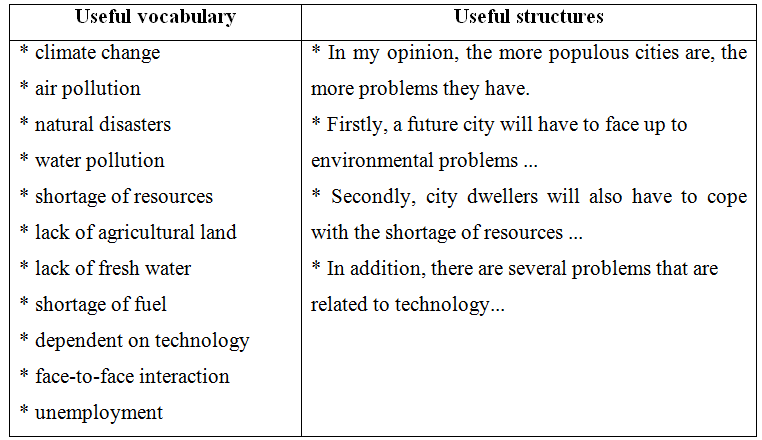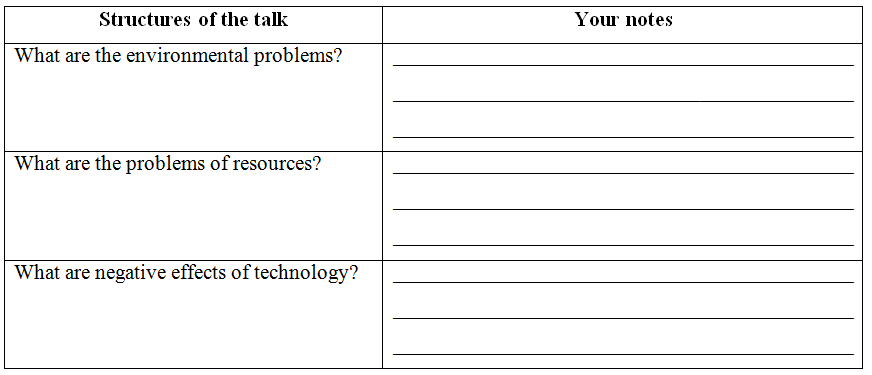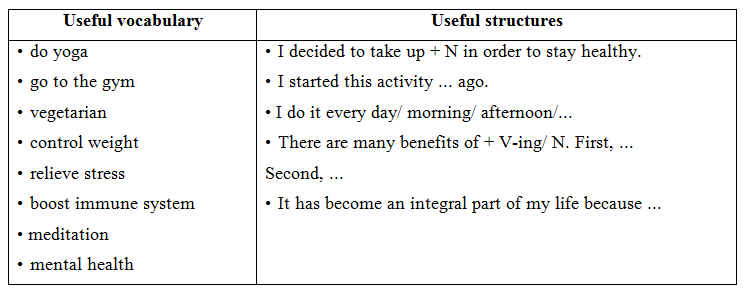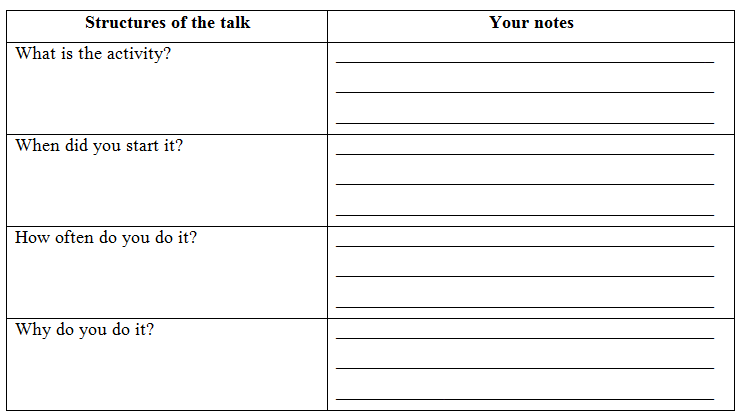Câu hỏi:
01/04/2024 78
Talk about problems a city will have to face up to in the future.
You can use the following questions as cues:
• What are the environmental problems?
• What are the problems of resources?
• What are negative effects of technology?
Useful languages:

Complete the notes:

Now you try!
Give your answer using the following cues. You should speak for 1-2 minutes.
1. In my opinion, the more populous cities are, the more problems they have.
2. Firstly, a future city will have to face up to environmental problems ...
3. Secondly, city dwellers will also have to cope with the shortage of resources ...
4. In addition, there are several problems that are related to technology ...
Now you tick!
Did you ...
- answer all the questions in the task?
- give some details to each main point?
- speak slowly and fluently with only some hesitation?
- use vocabulary wide enough to talk about the topic?
- use various sentence structures (simple, compound, complex) accurately?
- pronounce correctly (vowels, consonants, stress, intonation)?
Let’s compare!
Finally, compare with the sample answer on page 190.
Talk about problems a city will have to face up to in the future.
You can use the following questions as cues:
• What are the environmental problems?
• What are the problems of resources?
• What are negative effects of technology?
Useful languages:

Complete the notes:

Now you try!
Give your answer using the following cues. You should speak for 1-2 minutes.
1. In my opinion, the more populous cities are, the more problems they have.
2. Firstly, a future city will have to face up to environmental problems ...
3. Secondly, city dwellers will also have to cope with the shortage of resources ...
4. In addition, there are several problems that are related to technology ...
Now you tick!
Did you ...
- answer all the questions in the task?
- give some details to each main point?
- speak slowly and fluently with only some hesitation?
- use vocabulary wide enough to talk about the topic?
- use various sentence structures (simple, compound, complex) accurately?
- pronounce correctly (vowels, consonants, stress, intonation)?
Let’s compare!
Finally, compare with the sample answer on page 190.
Trả lời:
 Giải bởi Vietjack
Giải bởi Vietjack
Talk about problems a city will have to face up to in the future.
Dịch nghĩa câu hỏi:
Hãy nói về những vấn đề mà một thành phố trong tương lai phải đối mặt.
Bạn có thể sử dụng các câu hỏi sau đây làm gợi ý.
• Những vấn đề về môi trường là gì?
• Những vấn đề về tài nguyên là gì?
• Những tác động tiêu cực của công nghệ là gì?
Gợi ý trả lời:
MAIN IDEAS (Ý chính)
Environment (Môi trường)
* climate change (n.phr) (biến đổi khí hậu
* natural disasters (n. phr.) (thiên tai)
* air pollution (n. phr.) (ô nhiễm không khí)
* water pollution (n. phr.) (ô nhiễm nước)
Resources (Tài nguyên)
* shortage of resources (n.phr.) (thiếu tài nguyên)
* lack of fresh water (n. phr.) (khan hiếm nước ngọt)
* lack of agricultural land (n. phr.) (thiếu đất nông nghiệp)
* shortage of fuel (n. phr.) (thiếu nhiên liệu)
Technology (Công nghệ)
* dependent on technology (phụ thuộc vào công nghệ)
* unemployment (adj.) (thất nghiệp)
* less face-to-face interation (ít tương tác trực tiếp)
* too expensive (quá đắt đỏ)
Bài mẫu:
Cities are becoming bigger and more populous. It is predicted that up to 70% of population will live in cities in the future. In my opinion, the more populous cities are, the more problems they have. Firstly, a future city will have to face up to environmental problems. Rapid urbanization coupled with more frequent and extreme weather events linked to global climate change will exacerbate the impact of environmental threats. Secondly, city dwellers will also have to cope with the shortage of resources. Urban sprawl reduces available agricultural lands and make fresh water become scarce. In addition, there are several problems that relate to technology. With the development of technology, the quality of life will improve a lot but people will become too dependent on technology and we will gradually lose face-to-face interaction with others. Moreover, automatic production lines will make a lot of people unemployed in the future.
Các thành phố đang trở nên lớn hơn và đông dân hơn. Theo dự đoán, có tới 70% dân số sẽ sống ở các thành phố trong tương lai. Theo tôi, càng có nhiều người hơn thì càng có nhiều vấn đề hơn. Thứ nhất, một thành phố trong tương lai sẽ phải đối mặt với các vấn đề về môi trường. Đô thị hóa nhanh chóng cùng với các sự kiện thời tiết cực đoan và thường xuyên hơn liên quan đến biến đổi khí hậu toàn cầu sẽ làm tăng thêm tác động của các mối đe dọa đến môi trường. Thứ hai, người dân thành phố cũng sẽ phải đối phó với tình trạng thiếu tài nguyên. Sự phát triển đô thị làm giảm các vùng đất nông nghiệp có sẵn và làm cho nước ngọt trở nên khan hiếm. Ngoài ra, có một số vấn đề liên quan đến công nghệ. Với sự phát triển của công nghệ, chất lượng cuộc sống sẽ cải thiện nhiều nhưng con người sẽ quá phụ thuộc vào công nghệ và chúng ta sẽ dần mất đi sự tương tác trực tiếp với người khác. Hơn nữa, những dây chuyền sản xuất tự động sẽ khiến nhiều người thất nghiệp trong tương lai.
Talk about problems a city will have to face up to in the future.
Dịch nghĩa câu hỏi:
Hãy nói về những vấn đề mà một thành phố trong tương lai phải đối mặt.
Bạn có thể sử dụng các câu hỏi sau đây làm gợi ý.
• Những vấn đề về môi trường là gì?
• Những vấn đề về tài nguyên là gì?
• Những tác động tiêu cực của công nghệ là gì?
Gợi ý trả lời:
MAIN IDEAS (Ý chính)
Environment (Môi trường)
* climate change (n.phr) (biến đổi khí hậu
* natural disasters (n. phr.) (thiên tai)
* air pollution (n. phr.) (ô nhiễm không khí)
* water pollution (n. phr.) (ô nhiễm nước)
Resources (Tài nguyên)
* shortage of resources (n.phr.) (thiếu tài nguyên)
* lack of fresh water (n. phr.) (khan hiếm nước ngọt)
* lack of agricultural land (n. phr.) (thiếu đất nông nghiệp)
* shortage of fuel (n. phr.) (thiếu nhiên liệu)
Technology (Công nghệ)
* dependent on technology (phụ thuộc vào công nghệ)
* unemployment (adj.) (thất nghiệp)
* less face-to-face interation (ít tương tác trực tiếp)
* too expensive (quá đắt đỏ)
Bài mẫu:
CÂU HỎI HOT CÙNG CHỦ ĐỀ
Câu 1:
4. In the future, cars equipped with on-board computers will be able to__________and avoid traffic jams automatically.
4. In the future, cars equipped with on-board computers will be able to__________and avoid traffic jams automatically.
Câu 2:
Listen and fill in the blanks with ONE appropriate words.
1. The global population is predicted to reach___________billion in the future.
Listen and fill in the blanks with ONE appropriate words.
1. The global population is predicted to reach___________billion in the future.
Câu 4:
7. If you want to raise rents, you have to__________the housing first.
7. If you want to raise rents, you have to__________the housing first.
Câu 6:
9. A: We should eat more fruit every day.
B: Fruit is good for health, isn’t it? ________
9. A: We should eat more fruit every day.
B: Fruit is good for health, isn’t it? ________Câu 9:
- Write an essay (150 -180 words) about improvements we will see in the cities in the future.
You can use the following questions as cues:
* How will transportation change?
* How will buildings change?
* How will entertainment change?
__________________________________________________________________
__________________________________________________________________
__________________________________________________________________
__________________________________________________________________
__________________________________________________________________
__________________________________________________________________
__________________________________________________________________
__________________________________________________________________
- Write an essay (150 -180 words) about improvements we will see in the cities in the future.
You can use the following questions as cues:
* How will transportation change?
* How will buildings change?
* How will entertainment change?
__________________________________________________________________
__________________________________________________________________
__________________________________________________________________
__________________________________________________________________
__________________________________________________________________
__________________________________________________________________
__________________________________________________________________
__________________________________________________________________Câu 10:
Choose the best option to complete each of the following sentences.
1. Many types of__________energy such as wind and solar energy will never run out
1. Many types of__________energy such as wind and solar energy will never run out
Câu 11:
4. First change/ city/ future/ be/ change/ infrastructure.
→ ________________________________________________________
4. First change/ city/ future/ be/ change/ infrastructure.
→ ________________________________________________________
Câu 12:
6. A: It’s important for us to have a good command of English.
B: Yes, English is the most popular language in the world, isn’t it? ________
6. A: It’s important for us to have a good command of English.
B: Yes, English is the most popular language in the world, isn’t it? ________Câu 13:
10. A: My brother graduated from university with a good degree.
B: He graduated from Havard University, didn’t he? ________
10. A: My brother graduated from university with a good degree.
B: He graduated from Havard University, didn’t he? ________Câu 14:
18. A: The government should do something to limit the number of cars on the road.
B: I agree with you. Fumes from cars cause air pollution, don’t they? ________
18. A: The government should do something to limit the number of cars on the road.
B: I agree with you. Fumes from cars cause air pollution, don’t they? ________



